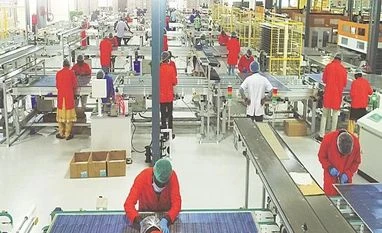The government's recent policy initiatives to promote the manufacturing of solar power equipment in the country will put the industry on a strong footing and help achieve ambitious targets, industry body ISMA said on Wednesday.
The government has set an ambitious target of 500 gigawatts of renewable capacity by 2030, which is about 5 times the current cumulative installations.
The majority of this target is expected from solar installations, targeted to touch 280 GW by 2030, which would require India to install 29 GW each year for the next 8 years.
"Though India has about 4 GW of cell and 13 GW of module manufacturing, Indian solar sector has been majorly dependent on imports from China. Modules import accounted for more than 65 per cent of total module demand in 2021," the Indian Solar Manufacturers Association (ISMA) said.
Of the total modules manufactured in India, only one-third of them used Indian cells. These imports have historically led to low-capacity utilisation of cell and module manufacturing in India.
"The recent steps by the Indian government have created a more positive environment for cell and module manufacturers in India and the solar manufacturing industry is ready to support the Government in achieving its vision," said Ashwani Sehgal, president, ISMA.
More From This Section
The government's DCR (domestic content requirement) schemes -- CPSU, KUSUM and Rooftop -- have ensured that Indian cells find favour in the solar industry, leading to high-capacity utilisation rates for Indian solar cell manufacturers.
These schemes have also helped hasten the movement to distributed solar power across the country, he said.
The levy of basic customs duty (BCD) of 40 per cent on solar modules and 25 per cent on solar cells from April 1, 2022, will provide Indian solar manufacturers a level playing field.
On top of it, increasing the kitty of incentives to be provided in the production linked incentives (PLI) scheme for solar manufacturing to Rs 24,000 crore will be a major boost.
"The solar manufacturing industry is now confident of quickly enhancing its capacities to meet the burgeoning requirements of its stakeholders," he said, adding these steps will lead to a multi-fold increase in new and high-efficiency capacities with upstream and downstream integration, resulting in a significant decrease in dependence on imports in the coming years.
The government has also introduced import tariffs on ancillaries like glass, EVA, backsheet and other components to encourage the development of local capacities for these materials which are an integral part of the solar manufacturing ecosystem.
All these moves by the Government of India will have a significant impact on domestic manufacturing, leading the country onto the path of energy security while ensuring significant development and employment in the industry.
"We appreciate the Indian Government for all its concerted efforts to grow solar power in India and make India one of the largest solar markets in the world. The solar industry fully commits itself to deliver to the nation a fully independent and self-sufficient solar manufacturing hub," he added.
ISMA is a registered association of companies engaged in the manufacturing of solar cells, modules, and glass for modules in India. Its members represent 80 per cent of the manufacturing capacity in India with combined investments of Rs 10,000 crore.
Indian solar manufacturers have an installed capacity of more than 3 GW for cells and 9 GW for modules annually.
)